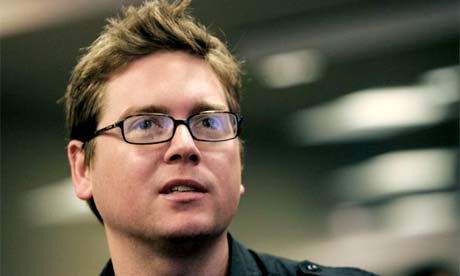Paul English and Biz Stone (pictured) have several things in common. These Massachusetts entrepreneurs are co-founders of prominent Internet technology companies – Kayak and Twitter, respectively. Each company has raised hundreds of millions in venture capital. Each is one of the most popular sites on the web in its class. Each is dancing with behemoths – Facebook and Google. And each founder was a student at the University of Massachusetts Boston. But that is where the similarities end. Both took very different paths to where they are today.
English achieved a masters degree in computer science from the University of Massachusetts Boston. He worked during college, doing programming for a bunch of companies, and even some video game software and sound-effect development.
Prior to Kayak, he co-founded several startups, including Boston Light Software, a small business e-commerce platform that was sold to Intuit. At Intuit, Paul became Vice President of technology and led small business Internet and product strategy, company-wide innovation process, and tech recruiting.
Stone lasted only a year at the University of Massachusetts Boston, on a theater arts scholarship. While working during college as a stock boy at a publishing company, he secretly designed a book cover and stuck it into a pile of outgoing designs when everyone was at lunch. When the client chose his design, Stone was made a designer and dropped out of college.
A friend pitched Stone on an idea for a new company called Xanga, a blogging site which they launched together. After moving to Los Angeles and returning to Boston, he was invited back to Mountain View to work at Google on Blogger, then left to set up Odeo, Twitter’s precursor.
Neither English nor Stone was initially motivated to go to college, but English stuck with it. Kayak’s market value is currently estimated to be $802,000,000. Twitter’s is $7,700,000,000. Both companies have a similiar amount of estimated revenue, about $150,000,000. While the story of these companies is far from over, which of these UMass Boston entrepreneurs appears to have made the right decision?
Seth Priebatsch, a Princeton drop-out and founder of SCVNGR, says:
“The term “drop-out” has very negative connotations and, I suppose, with good reason. Most people probably shouldn’t drop out of school, but for that small percentage of us out there who have a great idea burning up inside, dropping out is not just a good idea, it’s the right choice.”
Statistically speaking, though, entrepreneurs are more likely to be successful if they graduate from college than if they don’t. A survey of chief executive officers and product development heads at more than 500 high-tech companies showed that “education provides an advantage in tech entrepreneurship.” Specifically, the companies founded by college graduates had twice the sales and employment of the companies founded by people who didn’t go to college. Moreover, better-educated entrepreneurs are more likely to receive external financing.
Jason Baptiste, the CEO/Co-Founder of Onswipe, cautions budding entrepreneurs to ignore the sensationalist stories like Biz’s and the success that seems like it came overnight.
“It’s all difficult whether you are in college or not. It takes a lot of hard work and there’s a chance you will fail.”
If for some reason, something takes off, then consider going full time with it, Baptiste says. You could “stop out,” the equivalent of taking a sabbatical to focus on the company to see it through to an exit or failure. After that point, you can go back to school and finish what you started.
“This is what I did with my first real startup and I still think it was the right move. Sadly, things ended up failing, and I returned to school to finish what I started.”
(Republished on Wednesday, March 16, 2011 by Mass High Tech.)
The Venture Development Center is Boston’s leading startup incubator for technology and life science companies.

